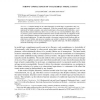Free Online Productivity Tools
i2Speak
i2Symbol
i2OCR
iTex2Img
iWeb2Print
iWeb2Shot
i2Type
iPdf2Split
iPdf2Merge
i2Bopomofo
i2Arabic
i2Style
i2Image
i2PDF
iLatex2Rtf
Sci2ools
107
click to vote
STACS
2009
Springer
2009
Springer
Strong Completeness of Coalgebraic Modal Logics
ABSTRACT. Canonical models are of central importance in modal logic, in particular as they witness strong completeness and hence compactness. While the canonical model construction is well understood for Kripke semantics, non-normal modal logics often present subtle difficulties – up to the point that canonical models may fail to exist, as is the case e.g. in most probabilistic logics. Here, we present a generic canonical model construction in the semantic framework of coalgebraic modal logic, which pinpoints coherence conditions between syntax and semantics of modal logics that guarantee strong completeness. We apply this method to reconstruct canonical model theorems that are either known or folklore, and moreover instantiate our method to obtain new strong completeness results. In particular, we prove strong completeness of graded modal logic with finite multiplicities, and of the modal logic of exact probabilities. In modal logic, completeness proofs come in two flavours: weak...
Related Content
| Added | 20 May 2010 |
| Updated | 20 May 2010 |
| Type | Conference |
| Year | 2009 |
| Where | STACS |
| Authors | Lutz Schröder, Dirk Pattinson |
Comments (0)

